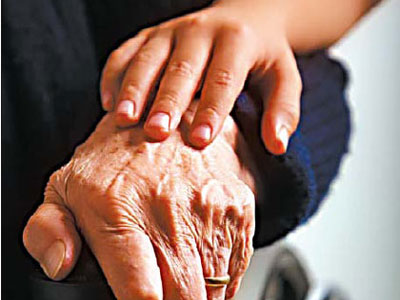Writing and occasional eye contact are the only way 48-year-old Gao Zhonghang can communicate with relatives and doctors, as a rare disease has deprived him of his ability to control the muscles in his mouth. Even swallowing food and drinking water are problematic for him.
Gao, who once worked in a county's tax bureau in Hebei Province, started to have problems articulating two years ago. Then, he started feeling a progressive weakness in his arms as the muscles started wasting.
Finally, one year ago in Beijing, he was diagnosed with amyotrophic lateral sclerosis (ALS). It is a rare, incurable disease, which the brilliant British theoretical physicist Stephen Hawking also has.
Doctors are giving ALS patients some hope. (photo: China Daily)
ALS is a progressive neurodegenerative disease that affects motor neurons in the brain and the spinal cord. When the neurons die, the ability of the brain to initiate and control muscle movement is lost. ALS patients increasingly lose their ability to move, as if they are frozen by ice.
As the disease progresses, patients gradually lose the use of their hands, arms, legs, and neck muscles, ultimately becoming paralyzed.
ALS patients often look smaller than normal people because, as muscles no longer receive messages from the motor neurons, they start shrinking and accordingly the limbs begin to look thinner.
Gao was the first ALS patient received last week by the Caregiving Center in the Second Hospital, affiliated to the China PLA General Hospital, which is cooperating with the Chinese Medical Doctor Association, to give medical aid to ALS patients. Ten patients will enter the program during its initial stage.
"We want to educate relatives so they can take better care of patients and prevent infections and complications," says Wei Dongning, director of the neurological department at the hospital.
So far, there is no cure for ALS, though there are drugs that can slow down the disease's progression in the early stages. Therefore, seeking an effective cure is a hot area of research.
For some early stage patients, Wei is trying stem cell therapy. For Gao, it is worth the efforts. "At least it can provide a glimpse of hope for my brother," says Gao's brother.
Doctors have taken samples of Gao's marrow and they will culture it in the lab for about two weeks, before injecting it into the patient's spinal cord.
Bone marrow cells have the ability to divide into neural cells with the potential for treating neurological disorders like ALS, Wei explains.
However, he also warns that as the mechanism of motor neuron death in ALS remains unclear, it is possible transplanted stem cells will not be resistant to the source of damage that causes motor neurons to die.
Wei emphasizes the therapy is at an experimental stage, but he is certain it will do no harm.
So far, stem cell treatment trials on ALS patients have demonstrated some short-term beneficial effects, but in the long term the prognosis is not so optimistic.
ALS was first identified in 1869 by the French neurologist Jean-Martin Charcot.
"It is a very cruel disease. The patient's mind is clear and normal, but finally, they can only lie on the bed, incapable of any movement," Wei says.
It is estimated that there are as many as 200,000 people diagnosed with ALS in China. For most of them, once their disease is diagnosed, all they can do is to stay at home and wait for the disease to develop.
In the later stages patients have difficulty in breathing and can only survive on a ventilator. However, this is expensive, costing between 700 and 1,000 yuan ($94-135) every day.
Even if the patients can afford it, they can only prolong their lives by a few years. On average, ALS patients survive between three to five years.
Hawking is obviously an exceptional case and one of very few people to have survived 35 years, already, with the disease.
"His is a rare subtype of the disease. But he demonstrates the fact ALS does not impair intellectual function at all. His survival provides hope for ALS patients," Wei says.
Early symptoms of ALS may include unusual fatigue and clumsiness, muscle weakness, slurred speech, and difficulty in swallowing. But it is often mistaken for other diseases in the early stages as there is no test that can definitively diagnose the disease.
For instance, when ALS patients complain of upper limb weakness to an orthopedist, they are commonly treated as if they have cervical spondylosis.
Misdiagnosis can aggravate the disease. A wider awareness of ALS among doctors and the public is urgently needed, Wei says.
(China Daily November 21, 2007)


